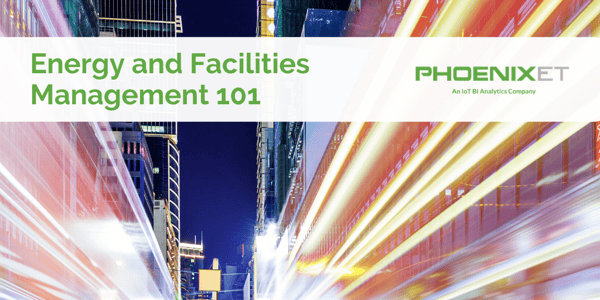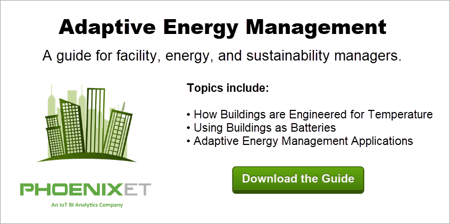Share this
FAQs In Energy and Facilities Management
by Phoenix Energy Technologies on Jan 27, 2020

The variety of factors that influence how much energy a building consumes and the pressures energy and facility managers face in balancing various priorities can be overwhelming. We have compiled a list of common questions below with links and guides as a meaningful resource for those managers.
What is Adaptive Energy Management?
Adaptive Energy Management (AEM) is an around the clock strategy that monitors and regulates building control systems, such as HVAC, in a dynamic approach. This approach takes into consideration multiple data sources, including current and historical weather conditions and occupancy levels, and optimizes building and mechanical systems based on the overall data.
AEM can increase profit, comfort, and efficiency by such things as:
- “Flattening” load shapes through optimized equipment scheduling and fine tuning of control loops ahead of peak demand times when electric rates are significantly higher
- Alerting management of required system maintenance, which can maximize the life of equipment
- Leveraging external data from systems such as ERP, CMMS, Utility Bill Accounting and others
Additional Information:
Adaptive Energy Management Guide
AEM: Stop choosing between energy savings and comfort
The Vision for PhoenixET and the Future of Energy Management
How does benchmarking help in facilities management?
Benchmarking allows facility and energy managers to assess and evaluate a building’s performance relative to the rest of their portfolio. Primarily, maintenance costs, energy demand and consumption, individual unit efficiency, and asset management are key metrics taken into account.
Setting benchmarks allows managers to measure and validate projects that provide a compelling ROI, highlight productive areas, and identify operational or infrastructure issues. Benchmarks also allow for better planning of eco-friendly and/or upgrade projects.
Additional Information:
Top 3 Benefits of Benchmarking for Facilities Management
5 Assumptions Setting Back Your Setpoint Strategy
Top 3 Benefits of Benchmarking for Facilities Management
What is closed loop control?
Closed loop control, through the use of machine learning algorithms, fine tunes the operation of the control system; in real-time. The addition of the machine learning algorithm effectively creates more precise loop control, adding an enormous amount of value for a building manager who is trying to balance the demands of managing a building effectively.
Additional Information:
Understanding Closed Loop Control
Adaptive Energy Management Guide
Top 3 Benefits of Benchmarking for Facilities Management
What is Delta T?
Additional Information:
How to Test the Quality of Your Preventative Maintenance
How to Get Buildings Ready to Reopen Following COVID Closures
What are Distributed Energy Resources?
Distributed Energy Resources (DERs) are small-scale power generation or power storage methods. These methods either generate energy or enable the buffering of that energy to provide greater flexibility to the main grid.
DER examples include:
- Solar power
- Fuel Cells
- Compressed air
- Microturbines
- Thermal energy storage
- Electrochemical Batteries
DERs are also referred to as on-site or BTM energy generation.
Additional Information:
What Energy & Facility Managers Should Know About DERs
Why Data Matters In Energy Management
Are You Managing Your Energy Spend?
What are examples of building energy management?
Here are five case studies spanning a variety of industries outlining how building energy management was carried out and improved energy use and spend.
- National Department Store Saves Energy & Improves Internal Regional Call Process
- National Grocery Chain Saves Over a Million Dollars Across Multiple Sites
- National Healthcare Group Solves for Centralized Management Issues
- Precision Building Management Controls for a National Retailer
- Spotlight on Energy Savings: A National Movie Chain Case Study
Additional Information:
How IoT Is Helping Facility Managers Control Energy Spend
Why Data Matters In Energy Management
What is facility management software?
Facilities management software connects energy and facility managers to their building data points and building control systems. The software enables more efficient and effective management, with many automation features often included.
Additional Information:
Smart Buildings, Building Automation - What’s the Point?
Leveraging Data Points Into Regulatory Compliance Tasks
Adaptive Energy Management Guide
5 Assumptions Setting Back Your Setpoint Strategy
What are good facility management conferences?
See below a list of the top facility conferences and workshops for energy and facility managers held each year.
- Edison Energy Institute’s semi-annual National Key Account Workshop - This workshop connects national, chain, and multi-site energy users to utility account and energy supply representatives where the latest technologies, products, and services designed to save energy consumers money are showcased.
- The International Facility Management Association (IFMA) hosts and co-hosts conferences all over the world every year. The goal is to educate and facilitate networking among facility managers.
- The National Facilities Management and Technology Conference and Expo turns 20 this year. They plan to include 100 sessions covering 8 different topic areas in 2020.
Additional Information:
Energy Workshop Lights Up Vegas - EEI Fall Accounts Workshop Wrap Up
Top 3 Benefits of Benchmarking for Facilities Management
What are good building energy management systems?
A robust building energy management system allows managers to conserve and reuse energy in dynamic ways by capturing data from all of the building’s electrical devices, mechanisms, etc. The management system needs to give managers the ability to identify issues, automate responses, automate alerts for troubleshooting and maintenance, evaluate benchmarks, and isolate and recommend ways to reduce energy waste.
Additional Information:
Leveraging Data Points Into Regulatory Compliance Tasks
Why Data Matters In Energy Management
Are You Managing Your Energy Spend?
Adaptive Energy Management Guide
What is load shifting?
Load shifting occurs when a building redistributes electric kW demand to “off peak” hours when grid energy is considerably less expensive.
Additional Information:
What Facility Managers Need to Know About Load Shifting - Part 1
What Facility Managers Need to Know About Load Shifting - Part 2
What are retail energy management solutions?
Retail energy management solutions refer to the computers and devices that monitor and control a retail store’s (or retail chain’s) energy use. Lighting and ventilation account for the bulk of energy use in retail, so it is important to capture this data at every location a retail chain may manage. Once data is coming in, software can automate monitoring and help isolate issues and areas where energy consumption can be reduced.
Additional Information:
Precision Building Management Controls for a National Retailer
Are You Managing Your Energy Spend?
Leveraging Data Points Into Regulatory Compliance Tasks
Our goal is to enable grocery stores, retailers, universities, theaters and many other industries to accomplish their energy savings goals with best-in-class software that monitors and controls building control systems.
If you would like an evaluation of your specific energy goals, please reach out to us below.
Share this
- Facilities Management (91)
- Energy Management (69)
- Company News (49)
- Smart Buildings (37)
- Retail (36)
- Building Management (24)
- Building Automation Systems (21)
- Sustainability (20)
- Energy Demand Management (19)
- EEI (15)
- Adaptive Energy Management (14)
- Grocery (14)
- demand response (14)
- Artificial Intelligence (12)
- Data Integration and Visibility (10)
- HVAC IQ (10)
- COVID-19 (8)
- Customer Spotlight (8)
- Carbon Management (7)
- Refrigeration Optimization (7)
- Setpoints and Temperatures (7)
- Equipment Maintenance (6)
- Operational Efficiency (6)
- Ask Ron (5)
- Asset Manager (5)
- Finance and Procurement (5)
- IoT and Digital Transformation (5)
- Awards (4)
- Comfort (4)
- Energy & Store Development (4)
- Safety and Compliance (4)
- Demand Charge Management (3)
- Energy Management System (3)
- Lifecycle Asset Management (3)
- Premium Services (3)
- Refrigeration IQ (3)
- Automated Demand Response (2)
- ConnexFM (2)
- Customer Service (2)
- HVAC Vendor Management (2)
- Load Shedding (2)
- Technician View (2)
- AIM Act (1)
- ALD (1)
- Analytics (1)
- Commissioning (1)
- Data (1)
- Data Integration and Visualization (1)
- EMS (1)
- Knowledge Center (1)
- OSHA (1)
- asset management (1)
- January 2026 (1)
- December 2025 (1)
- November 2025 (1)
- October 2025 (2)
- September 2025 (1)
- August 2025 (3)
- July 2025 (1)
- June 2025 (1)
- May 2025 (2)
- March 2025 (2)
- February 2025 (1)
- January 2025 (2)
- December 2024 (2)
- October 2024 (1)
- September 2024 (1)
- August 2024 (2)
- June 2024 (2)
- April 2024 (2)
- March 2024 (2)
- January 2024 (1)
- December 2023 (1)
- October 2023 (2)
- September 2023 (2)
- August 2023 (2)
- July 2023 (1)
- May 2023 (2)
- April 2023 (2)
- March 2023 (3)
- February 2023 (1)
- January 2023 (1)
- December 2022 (1)
- November 2022 (2)
- October 2022 (2)
- September 2022 (1)
- May 2022 (2)
- April 2022 (1)
- March 2022 (3)
- February 2022 (2)
- January 2022 (4)
- December 2021 (2)
- November 2021 (3)
- October 2021 (1)
- September 2021 (3)
- August 2021 (4)
- July 2021 (1)
- June 2021 (2)
- May 2021 (1)
- January 2021 (2)
- December 2020 (2)
- November 2020 (2)
- October 2020 (3)
- September 2020 (4)
- August 2020 (3)
- July 2020 (2)
- June 2020 (3)
- May 2020 (3)
- April 2020 (5)
- March 2020 (5)
- February 2020 (4)
- January 2020 (4)
- December 2019 (4)
- November 2019 (3)
- October 2019 (4)
- September 2019 (5)
- August 2019 (4)
- July 2019 (4)
- May 2019 (2)
- April 2019 (3)
- February 2019 (1)
- December 2018 (1)
- November 2018 (1)
- October 2018 (3)
- September 2018 (3)
- August 2018 (3)
- July 2018 (3)
- June 2018 (3)
- May 2018 (1)
- June 2015 (1)
- March 2013 (1)
- January 2013 (1)
- December 2011 (1)
- October 2011 (1)
- September 2011 (1)



